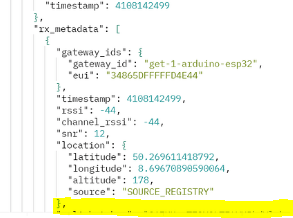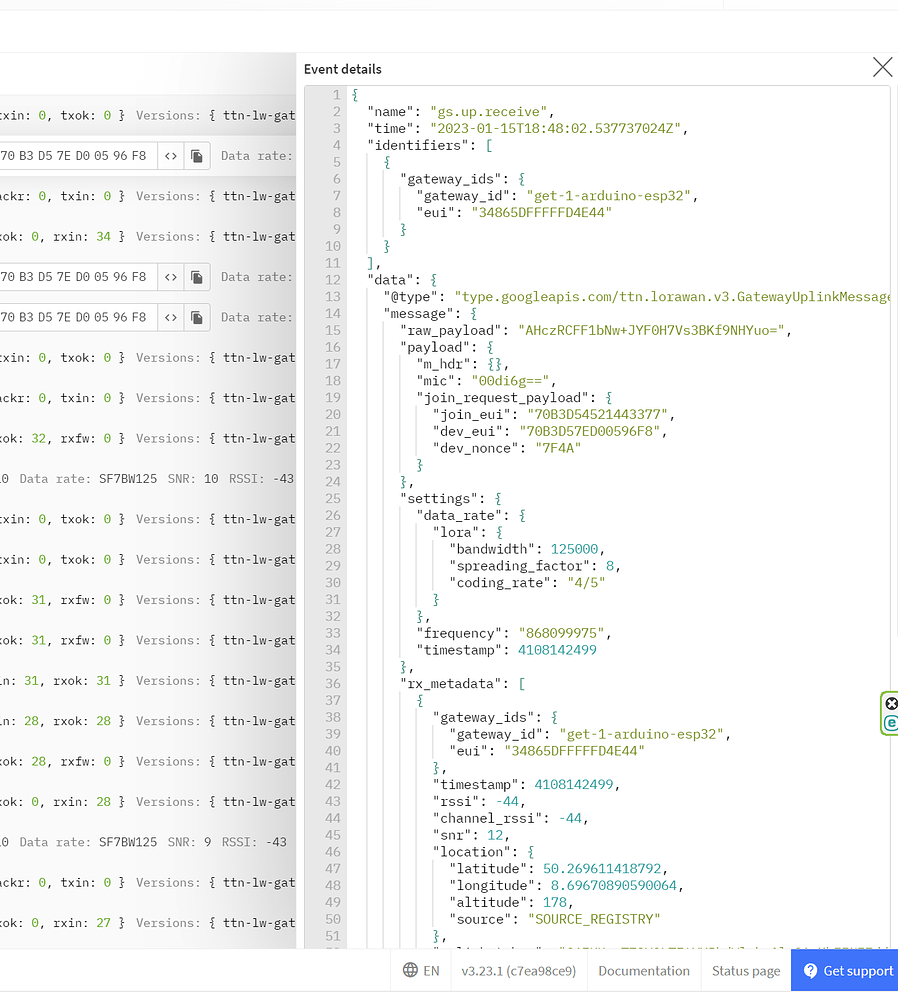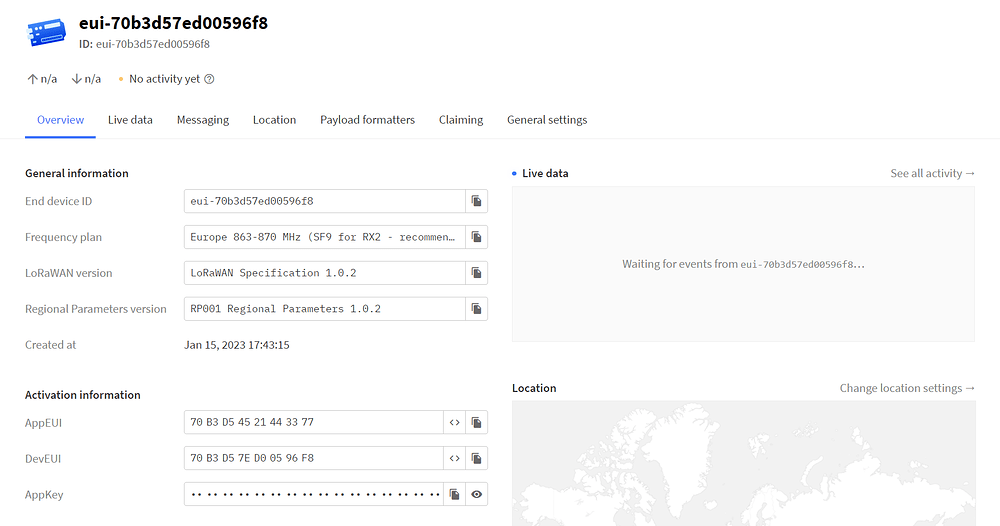I run test gateway esp32, which is connected to TTN and transmits data, unfortunately I have a problem with Nods on esp32 based on MCCI LoRaWAN LMIC library 4.0, which tries to connect through my gateway, you can see that packets are received, but nothing else happens I’m 100% sure that AppEUI and DevEUI are correct, the applikation completely ignores or does not go to her these packets type JOIN. Or there is some BAN of my Gateway, but I have no info.
Welcome.
The number one hit on here for node not joining, if you did searched for it, reduce your RSSI.
Is this a single channel gateway?
If it is please remove it, they are disruptive to the network and other community members.
You are not using a LoRaWAN compliant gateway. Please disconnect immediately and buy a real gateway that adheres to the LoRaWAN standard and does not cause issues for other TTN users.
Does it mean that there is some kind of blocking of strong signaling?
There is no Gateway in my area and I want to start a small project related to LoraWAN and I needed to run Indore Gateway.
This little project is a nonprofit I don’t want to invest in something I won’t use.
Whatever reasons you might think you have for using a non-compliant single channel device, they are still not supported as proper gateways.
So dont expect TTN to re-design its systems to make them ‘work’.
Remember its a Community network, largely built and supported by volunteers and the ‘community’ alongside benevolent companies, councils and colleges etc… YOU are the community - so why not deploy a (compliant!) GW and help us all build this thing together… ![]()
![]()
![]()
For that you need LoRaWAN compatible and compliant hardware which your current gateway is not. Your hardware can be used to build your own LoRa, not LoRaWAN, network, however that is not the focus of this forum.
OK, I understand that single chanel gateway is not welcome in TTN, but is such Gateway and packets it transmits blocked ? I have not found any information on this subject.
Is there any virtual system compatible with TTN v3 on which I could test my tests.
As stated - not supported - therefore do not expect a valid answer ![]()
You could run your own TTS instance or pay for one via TTI - just dont peer it with other legitimate networks … otherwise GIYF…
Note compliant (8 channel) GW’s are available for <$100 so no real reason to not get one - we generally recommend having your own GW anyhow for debugging a node development as you can see what happens in Gw/Console views. You can also recycle your ESP device with a LoRaWAN module or otherwise with Radio and LMIC etc. to get value as a node ![]()
Effectively yes, but not by TTN, but by the fact that you are not using a compliant gateway which the device is expecting to talk to. It speaks fluent LoRaWAN, your gateway speaks a sort of dialect of LoRa that almost sounds like it knows a bit of LoRaWAN but can only hear a fraction of the what’s said.
Try putting diesel in a petrol car - you may just about be able to hack something that coughs & splutters down the road, but at the end of the day, there’s a clear mismatch.
Please be aware that not all gateways are publicly listed and that there is more than just TTN / TTI as a LoRaWAN network. So please do not assume that because you aren’t aware of any other local gateway, there aren’t any along with devices that can be disrupted by the presence of a Single Channel Packet Forwarder.
If this project is for a non-profit, it’s important that you do it right so it works in the long term. A TTIG will cost you around €90. At worst, you can sell it on eBay for very little loss.
Please heed the advice given, it’s based on years of experience with LoRaWAN and the need to ensure the integrity of the community network.
Won’t work for the same reason the community network does not work, the gateway does not adhere to the required standards as enforced by the software. And because all options use the same code base the result will be the same, it will not work.
And the cost of running your own TTS instance or paying for one via TTI is vastly more than the cost of a TTIG …
If I look at the rx_metadata you posted from the node and I read it correctly, their is a second gateway RX your node, the screenshot is cut off.
Expand the rx_metadata and look gateway_ids, so switch off that single channel thing and you could be good to go.

Their is a gateway 3.73km from you.
![]()
Their could be more than this one in range of your node, the only way to tell is to check gateway_ids
Hi, 3km is too far for a device that is in a room with a small antenna to that the signal passes through the forest.
For a considerable period of time I tested the reception alone if I could receive something, of course, in the room, maybe within a week I sometimes received two nodes with a signal of about. -121.
OK I’m looking for a solution to start a project, but after what I read I’m past the enthusiasm and desire to get into this topic.
I wanted to prepare a NODA for one club in the area where I tested a noda that was only received through one Gateway in Karben (Hessen) and it had to drive very close.
Thanks for all the information and the topic can be closed.
I found something like this - LoraWAN MikroTik R11e-LoRa8 mPCI module - will it provide me with running a seamless LoraWAN Gateway and will the lora software that Mikrotik offers be compatible in the future. I am a fan of Mikrotik and own quite a few of their devices.
Who said that?
Did you actually look at the rx_metadata?
They work, if you get the stand alone version they can act as a WI-Fi AP as well and they are outdoor rated.
I have a couple if MikroTik gateways (wAP LoRa8 kit and LtAP LoRa+LTE kit) and those work without any issue.The configuration is a bit awkward if you are used to other gateways, however for RouterOS users it should be familiar.
The answer to that requires a crystal ball. However I haven’t seen any indication that the protocol used by the MikroTik gateways will be phased out. There are plenty of other brands using the same protocol so my guess is it will be around for some time.
I need to put everything together , what will be the best solution with compatibility in the future:
- buy a ready-made product such as TTIG ( for testing OK, cheap but limited in further use )
- development on Mikrotik board with R11e-LoRa8 module (future compatibility ?).
- Rasberry PI and WM1302 module (what are the pros and cons ?)
I’m wondering what solution to take in order to be trouble-free and developmental in the future, and to use in another location (Outdor).


